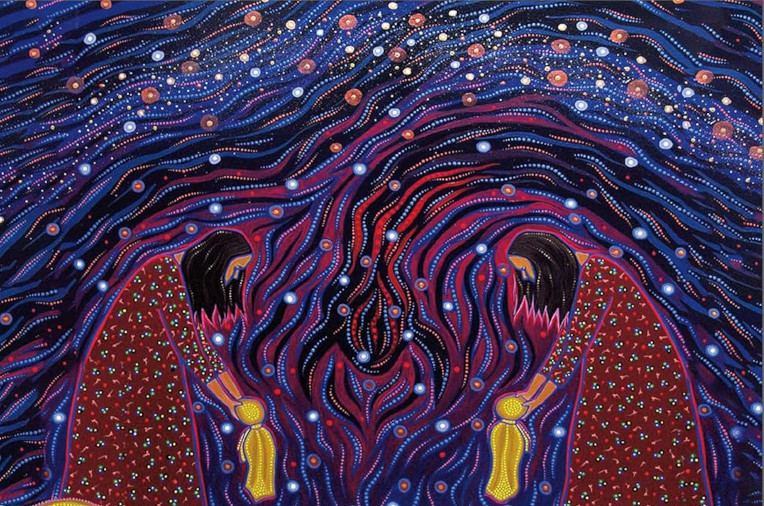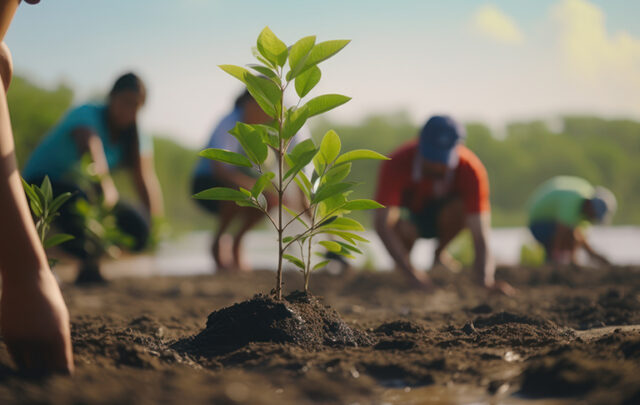 Ed. note: This post is an excerpt from The Story is in our Bones by Osprey Orielle Lake and published by New Society Books.
Ed. note: This post is an excerpt from The Story is in our Bones by Osprey Orielle Lake and published by New Society Books.
It is truly humbling to contemplate the enormity of Mother Earth’s generosity to us. The Earth freely provides life-giving offerings of water, fruits, vegetables, animals, herbal medicines, shelters, and so much more. As we work to revive and renew a reciprocal relationship with the Earth that enhances all ecological systems and is socially just, we need to uplift a paradigmatic economic shift that respects and honors the gifts from the web of life and a relationship with the community all around us—what I like to call an Earth Community Economy. At this time of multiple crises, we have an urgent need and opportunity to remake our systems of exchange and re-evaluate what is actually valuable, and how we approach our relationship to the web of life. As LeGuin expressed, any human power can be resisted, and we can make other choices.
Our extractivist, colonial economic model demands that humans endlessly take more and more from the Earth without long-term considerations. By design, it requires that we exploit Mother Earth and turn her gifts into a commodity. This exploitive economy also takes activities that people used to share and exchange with each other without money, and runs them through this same predatory economic system.
Yet, when we take a deep breath and slow down to really think about it, the things that actually make our lives possible and joyous very often are not the things that require extractivism or items to purchase. Photosynthesis, the hydrologic cycle, love, friendship, walking in the beauty of nature, mutual aid, sharing stories and meals,-these are all things that can be done without financial exchange. In the current dominant culture worldview, which commodifies everything and sees things only for their deemed financial worth, we become further detached from what is given freely—wildflowers and glaciers are exiled to the realm of the superfluous since there is no monetary value assigned to them. We are taught in the commodification culture to lose respect and appreciation for many non-financially related treasures.
To counter this rapacious economic worldview, we can work to restore what many have called a gift economy—a system that many of our ancestors participated in, some communities still practice today, and has engaged an ever-growing network of thought leaders. One of the central principles is not to hoard wealth; rather, the gift economy framework is about understanding that the only way the entire breathing, living ecology of place and community survives and thrives is through mutual aid. By making and giving gifts and moving those gifts through the community, we ensure our human and nonhuman relatives are taken care of. The essence of this exchange model is about aligning our economies with the natural laws of the Earth and our neighbors.
In communities that have practiced a gift economy, valuables are not exchanged for money or for other goods but are instead given with no outward agreement that anything will be immediately returned. There is an implicit expectation that the person who received the gift will also give at some point in the future, whether back to the giver, to another person, to the land, or to the whole community, and until that happens, one remains in a state of positive debt. While debt is uncomfortable for those of us who live in a market economy, in a gift economy, debt is what binds one to the gift-giver and to the whole community, intentionally creating an atmosphere of ongoing reciprocity.
A gift economy was, and is today, often practiced by hunter-gatherer communities. Hunters would share their kill with the whole community; gatherers would share their plants, fruits, and nuts; and artisans and healers would share their skills. Individuals within the community were not paid for what they hunted, foraged, created, or offered, but they could rely on the reciprocal relationship between themselves and their community to care for them. When a hunter from Brazil’s Indigenous Piraha Tribe was asked why he shared the substance of a particularly successful hunt with his guests at a large celebration rather than drying and saving the meat, he explained, “I store meat in the belly of my brother.”
An important facet of a true gift economy is how it is integrally wedded to upholding practices of taking and gifting with ecological well-being and future generations in mind. Plant ecologist and author Robin Wall Kimmerer of the Citizen Potawatomi Nation tells us, “Collectively, the indigenous canon of principles and practices that govern the exchange of life for life is known as the Honorable Harvest. They are rules of sorts that govern our taking, shape our relationships with the natural world, and rein in our tendency to consume—that the world might be as rich for the seventh generation as it is for our own. The details are highly specific to different cultures and ecosystems, but the fundamental principles are nearly universal among peoples who live close to the land.” The Honorable Harvest is not a set of rules that can be enforced, but an agreement humans make with the land and with those who provide for us.





